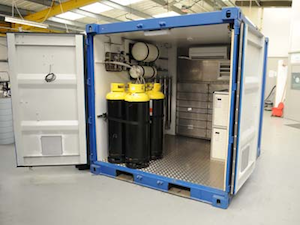Project Alkammonia: Ammonia-fed Alkaline Fuel Cells
By Trevor Brown on April 25, 2013
The project to commercialize ammonia-fed fuel cells for stationary power generation continues to gather momentum in Europe, under the title “Project Alkammonia“.
This follows last year’s field trials of Diverse Energy’s PowerCube technology in Africa, and AFC Energy’s subsequent acquisition of assets from Diverse Energy (equipment and IP) and further project funding.
Project ALKAMMONIA will integrate three innovative and proven technologies: a highly efficient and low-cost alkaline fuel cell system, a highly efficient fuel processing system and a novel ammonia fuel system. The integrated system will be rigorously tested and the results shared with leading telecommunication end-users.
Project Alkammonia information from CORDIS archive
The initial business model aims to provide clean power for mobile radio masts (remote base transceiver stations), and the technology can provide uninterruptible power or act as a back-up for intermittent renewables, as described in Diverse Energy’s field trial report:
Through the trial, PowerCubes provided operators with continuous ‘prime’ power (24/7 uptime) and/or efficient back-up power to existing power delivery systems. This has resulted in improved uptime for the operators and reliable mobile and data services for their customers … [and] enabled the operators to reduce CO2 emissions to almost nil at the trial sites (base stations), and to make operating savings of up to 60 per cent.
For the trial, four PowerCubes were … subjected to the extremes of Namibia’s climate conditions, topography and varying power and logistical demands … The sites came with different existing power delivery systems … these ranged from grid electricity through to solar and wind technologies.
Diverse Energy, field trial report for PowerCube in Namibia (document unavailable to download)
The report also illustrates one of the four trials in detail:
As the sun fell each night the available light gradually diminished, reducing the power generated by the solar panel. Due to deep discharging, the battery array was severely depleted … unable to power the cell site radio infrastructure during hours of darkness. The PowerCube was configured to operate in a constant voltage dynamic load following mode, gradually increasing its output to support the radio load as the battery charge was depleted. As a result, the sum of the powers from the PowerCube and the battery exactly matched the required load, with the PowerCube operating automatically based on demand. Throughout the field trial, the PowerCube achieved continuous radio operation.
Diverse Energy, field trial report for PowerCube in Namibia (document unavailable to download)
Taking the project forward, AFC Energy’s project partners include Fuel Cells Systems Ltd, UPS Systems Plc, and Acta SpA (who provide the NH3 cracker design, and are also involved in the SAVIA project).
Alkaline fuel cells (AFC) are ideally suited to run on ammonia since, in contrast to acidic fuel cells such as PEM, the alkaline nature of NH3 does not harm the AFC. AFCs can operate directly using cracked ammonia, avoiding the need for an expensive hydrogen ‘cleanup step’. This increases system efficiency and decreases capital and operational costs. With efficiencies of over 60% at full load conditions, AFCEN’s proprietary AFC system is arguably the most cost effective fuel cell system available.
Project Alkammonia information from CORDIS archive
Project Alkammonia received a grant (up to 1.96 million Euros) from the Fuel Cells and Hydrogen Joint Undertaking (FCH JU), a public-private partnership between the European Commission, fuel cell and hydrogen industry members (NEW-IG: New Energy World Industry Grouping), and the research community (N.ERGHY: New European Research Grouping on Fuel Cells and Hydrogen).
The FCH JU recently published its Annual Implementation Plan 2013 (pdf). They also maintain an online archive of project funding from previous years:
- “NH3 4 PWR” Validation of integrated fuel cell system readiness (Diverse Energy, PowerCube, project duration September 2010 to August 2013)
- “TowerPower” Demonstration of fuel cell based integrated generator systems to power off-grid cell phone towers, using ammonia fuel (Diverse Energy, PowerCube, project duration November 2011 to October 2014)
